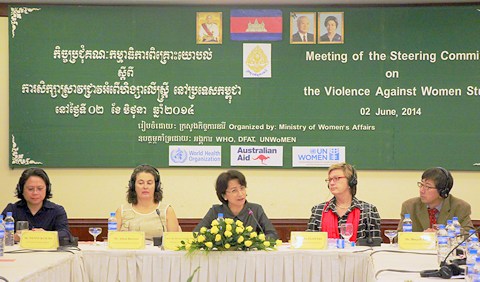UN Women and WHO Joint Announcement
Date:
Cambodian Ministry of Women´s Affairs, with support from UN Women and WHO, launches study into the Prevalence of Violence against Women
On 2 June 2014 the Cambodian Ministry of Women’s Affairs, supported by UN Women, the World Health Organisation (WHO) and the Australian Embassy in Cambodia, launched a new study into the prevalence of violence against women in Cambodia in an effort to end the world’s worst pandemic.

The purpose of the study, which will be undertaken throughout 2014 with results due in 2015, is to generate representative data among women aged 15-64 about their experiences of violence. “This important step would not be happening without the convergence of WHO expertise, the political will and leadership of the Ministry of Women´s Affairs and the strategic vision and financial support of the Australian government,” highlighted UN Women Country Representative Wenny Kusuma speaking about the level of fostered partnership in Cambodia to address the tide of violence.
Guided by Cambodia’s National Action Plan on the prevention of Violence against Women, a multi-stakeholder, coordinated, whole-of-society approach to prevention of violence against women is being taken in Cambodia. This approach ranges from strengthening service provision, to addressing attitudes and values and is grounded in the need for reliable evidence based policy design.
The study aims to increase evidence on the prevalence of physical, sexual and emotional violence against women and girls by intimate partners as well as by non-partners. Additionally, the study aims to identify the links between intimate partner violence and various health outcomes as well as identify factors that may be associated with reducing a women´s vulnerability to violence.
In collecting data on the prevalence of violence and documenting the strategies and services that women use to cope with violence, the study will be able to inform policy makers on the interventions necessary to address violence against women in Cambodia. In addition, the results will complement and inform the work that UN Women will be undertaking to cost the response to violence against women, including the out of pocket costs of victims of violence. “Having good data implies having good policies” said Australian Ambassador Alison Burrows at the launch of the study. Reliable data will also be critical to inform the health sector response to violence against women. WHO is also supporting Cambodia in the development of national clinical and policy guidelines.
The study will be a nationally representative population-based survey using WHO multi-country methodology consisting of a combination of quantitative and qualitative research methods. The employment of existing questionnaires, interview guides and group exercises developed to internationally recognized standards of excellence will ensure the quality and reliability of results and allow for comparison with other countries.
Following the recent publication of a regional study into prevalence of violence against women from the male perspective, this new study’s focus on women´s experiences will build on existing data to create a more complete picture of gender-based violence in Cambodia. “The worst challenge [in tackling violence against women] is silence, this study will help us to break the silence,” said WHO Country Representative Dr. Dong-il Ahn.
This work is coordinated by WHO and supported by UN Women Cambodia’s Ending Violence Against Women Programme, through generous funding from the Australian Government’s Department of Foreign Affairs and Trade. For further information on this Study, please contact Inala Fathimath at [ Click to reveal ] and Debbie Gray at [ Click to reveal ]
Related link